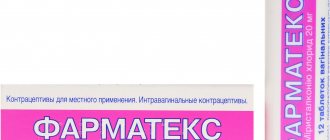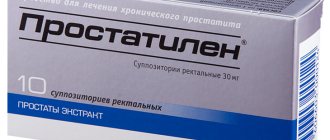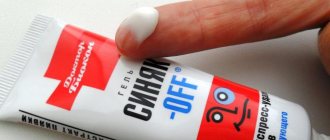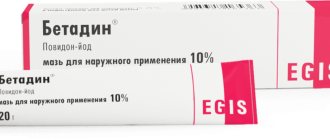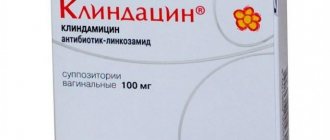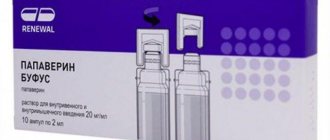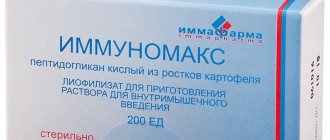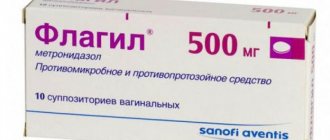- October 19, 2018
- Cardiology
- Yulia Lobach
The negative symptoms caused by spasms are well known to everyone. Abdominal pain, headache and even arterial hypertension are quite dangerous conditions. It is especially bad if blood vessels undergo spasms. Doctors have long wanted to get a drug that would effectively protect the patient’s body from spasms. Such a remedy actually exists - these are the well-known Papaverine candles.
Properties of the medicine
Papaverine hydrochloride suppositories, after administration into the rectum, affect the smooth muscles of the bronchi, lungs, large and small intestines, stomach, and uterus. However, the effect of the drug does not apply to the muscles of the skeleton and heart. After the product enters the body, these muscles work as usual.
Properties of the drug:
- elimination of smooth muscle tone in various pathologies;
- lowering blood pressure, dilating blood vessels;
- increased blood flow in all internal organs;
- normalization of heart rate;
- providing a sedative effect.
During childbirth, women are prescribed Papaverine suppositories to relieve cervical hypertonicity. Many people are interested in how to administer the drug vaginally or rectally? Papaverine suppositories are inserted into the patient's anus.
Overdose
If you constantly increase the recommended therapeutic doses when using papaverine, then signs of overdose may appear:
- drowsiness;
- excessive fatigue;
- double vision;
- weakness;
- decreased blood pressure;
- intoxication of the body;
- disturbance of the rhythm of heart contractions;
- attacks of arrhythmia;
- nausea, vomiting.
Rinse the stomach immediately , drink a glass of milk, take activated charcoal if side effects are observed 1-2 hours after taking papaverine hydrochloride. It is also important to measure your blood pressure.
In case of excessive drop in indicators, vomiting and dizziness, it is better to call an ambulance without waiting for your health to worsen.
Indications
What is the medicine used for? Papaverine suppositories are used for many diseases that are accompanied by pain. The drug is widely used in gynecology, urology, and surgery.
Main indications:
- all types and stages of hemorrhoids;
- headaches caused by vasospasm;
- pain syndrome in various diseases of the digestive system;
- renal colic;
- pathologies of the urinary tract – pyelonephritis, cystitis, urolithiasis, urethritis;
- bronchitis, pneumonia;
- pain in women during menstruation.
Papaverine helps relieve spasms in various diseases
Papaverine suppositories have a positive effect on the gastrointestinal tract during constipation and help normalize stool. The drug effectively fights migraines. For bronchitis, the medicine relieves spasm from the bronchi and helps prevent swelling of the mucous membrane.
Mechanism of action
The therapeutic effect of Papaverine suppositories is ensured by suppressing the phosphodiesterase enzyme. Thanks to this, it is possible to relieve muscle spasms and relax muscle fibers. The medicine has an effect on the human genitourinary, digestive, and hepatobiliary systems, and also relieves vasospasm. The active component papaverine hydrochloride increases the lumen of blood vessels, thereby normalizing systemic blood pressure. After administration of the drug, its active component quickly penetrates the bloodstream. Papaverine hydrochloride is evenly distributed throughout the body, affecting the central nervous system.
Important! During use during pregnancy, the drug can penetrate the placenta to the fetus and enter milk during breastfeeding.
Composition and release form
Papaverine suppositories can be bought in pharmacies without a prescription; it is produced by various pharmaceutical companies. In Russian pharmacies the drug is available from Belarusian and Russian manufacturers.
Three dosage forms can be found on sale, each of which differs in its purpose, namely: tablets, rectal suppositories and injection solution.
Rectal papaverine suppositories are white to yellowish-white or creamy-white, torpedo-shaped.
One suppository contains 20 mg of papaverine hydrochloride.
In addition to the active ingredient, candles contain stearins and solid fats that melt at human body temperature, and emulsifiers.
Contraindications
The instructions for use include a number of contraindications that must be taken into account when using the medicine. These include:
Read the article: Relief Ultra suppositories for hemorrhoids and their instructions
- presence of allergies to the components of the drug;
- increased intraocular pressure in glaucoma and other diseases;
- liver failure, accompanied by severe course;
- blockade of the heart muscle;
- old age of the patient;
- children's age up to 12 years.
Papaverine is prescribed by a doctor who must study the patient’s medical history and exclude all possible contraindications.
Use in childhood
The recommended form of use of Papaverine for infants under 1 year of age is rectal suppositories. It is acceptable to use tablets, injections, solutions, but for older children.
Main indications for use:
- for babies under 1 year of age – renal colic, cholecystitis, endotheritis, angina pectoris, intestinal colic, cerebral vascular spasms;
- children over 3 years old - urethral spasms, hepatic colitis, pancreatitis, bronchospasms, hyperthermia with vascular spasms in the periphery, high body temperature as an antipyretic.
Sometimes Papaverine is prescribed to children before surgery.
There are contraindications when using Papaverine tablets:
- children under 6 months;
- liver failure;
- excessive hypersensitivity to the active substance.
The drug requires careful use in cases of traumatic brain injury, adrenal dysfunction, and hypothyroidism. Possible side effects: pressure surges, nausea, vomiting, constipation, drowsiness, excessive sweating.
The dosage for children should be observed taking into account age. If tablets are used, it is not advisable to chew them. It is important to swallow them whole. washed down with water. If injections are used, then a single dose for children over one year of age is 300 mg.
Administration should be done slowly enough to avoid blockade and failure of the heart muscle.
Acceptable dosages for children based on age:
- 0.5 - 2 years - 5 mg, 1/4 tablet;
- 3-4 years – 10 mg, 1/2 tablet;
- 5-6 years - 12 mg, 1 tablet;
- 7-9 years - 15 mg, 1.5 tablets;
- 10-14 years - 20 mg, 2 tablets.
How to light candles
Where to insert Papaverine and how often can it be done? Suppositories should be used only as prescribed by a doctor. Typically, adults are administered 20-40 mg of the drug 2-3 times throughout the day. Sometimes a specialist may adjust the dosage depending on the diagnosis. Considering the question of how long the drug takes to act, it should be noted that on average the effect occurs after 30 – 40 minutes. Sometimes you have to wait longer for results. This depends on the characteristics of the disease and the individual qualities of the body.
The suppository should be administered according to the instructions.
With uterine hypertonicity
Increased uterine tone threatens premature birth. Papaverine suppositories help relieve spasms and relax smooth muscles. According to the doctor’s recommendation, a woman is given 2–3 suppositories throughout the day to tone the uterus. It is advisable for every pregnant woman to have this medicine in her home medicine cabinet, since when a spasm occurs, this drug will become an ambulance. The drug should be used carefully during treatment with other vaginal and rectal suppositories.
Sometimes the medicine is used among women in labor for false contractions. During this period, the woman experiences pain in the uterus and lower back, but this condition is only a harbinger of an imminent birth. To make a woman feel better, suppositories can be prescribed.
Possible side effects
Negative phenomena associated with the use of suppositories are extremely rare. This is evidenced by numerous positive reviews from patients and doctors who have tested the drug in practice. Sometimes during treatment with the product, minor itching and irritation occurs in the anal area. If the dose is greatly exceeded, the patient may experience the following complications:
- heart rhythm disturbance;
- dizziness;
- apathy and drowsiness;
- difficulty urinating and defecating;
- nausea, less often vomiting.
Treatment of the complications described above consists of blood purification and symptomatic treatment of the patient.
Important! If alarming signs develop during therapy with Papaverine, you should stop taking the drug and immediately visit a doctor.
Drug interactions
With other drugs
Papaverine is not recommended to be used together with Alprostadil, since the combination of these drugs increases the risk of developing a pathological condition accompanied by a prolonged painful erection.
The intensity of the effect of anticholinergic drugs on the body increases.
With the simultaneous use of Papaverine and Levodopa, a decrease in the effectiveness of the latter remedy is observed. The activity of the components of Methyldopa that exhibit a hypotensive effect also decreases.
If alcohol-containing drinks are consumed during treatment with Papaverine, the likelihood of developing hypotension increases.
Alcohol compatibility
If alcohol-containing drinks are consumed during treatment with Papaverine, the likelihood of developing hypotension and fainting increases.
special instructions
When starting treatment with the drug, you should carefully study the instructions for use. It includes several special instructions that must be followed. These include:
- the medicine should be used with extreme caution in cases of severe renal failure;
- During treatment with suppositories, it is important to stop drinking alcohol;
- During pregnancy and lactation, suppositories are used under the strict supervision of a doctor. To date, there is not enough information about the safety of using the drug during this period;
- the active component of the drug can have a relaxing effect on the central nervous system, therefore, among people whose work activity requires increased concentration, the drug is used carefully.
In addition, if the patient is taking any other medications, be sure to inform the doctor.
Before starting treatment, it is important to read the instructions for the drug
Analogues of the drug
How to replace Papaverine suppositories? Among the analogues of the drug, the following drugs can be distinguished:
- No-Shpa is a medicine that is used for diseases associated with spasm of the smooth muscles of internal organs and blood vessels, as well as for the treatment of periodic pain;
- Spazmolysin suppositories - inserted into the anus for pain syndrome arising from diseases of the gastrointestinal tract and other organs, cholecystitis, pancreatitis, cystitis and other pathologies;
- Spascuprel - used to relax the smooth muscles of internal organs in diseases of the stomach, intestines, pancreas, kidneys and other organs;
- Theophedrine ІС – used for bronchial asthma, obstructive bronchitis to eliminate bronchospasm and ease the patient’s breathing;
- GastroComfort is an antispasmodic and carminative drug that is prescribed to patients with diseases of the digestive system;
- Niaspam - used for irritable bowel syndrome, renal and hepatic colic, and other pathologies of the digestive system.
You should take any of the analogues only after examination by a doctor.
Self-medication often causes serious negative consequences.
Application for children
The high safety of the drug is evidenced by the fact that it can be given to children from the age of six months. In some cases, a pediatrician may prescribe the drug at a younger age, but most doctors do not welcome this practice.
Most often, “Papaverine” is prescribed to children to eliminate cramping abdominal pain, intestinal colic and bronchospasms, spasms and colic of the liver, urethra, and pancreatitis. There is also the option of using “Papaverine” in pediatrics to combat peripheral vascular spasm during hyperthermia. The antispasmodic is given to the child twenty minutes before the antipyretic.
Patient reviews
Stanislav, Cheboksary “I was prescribed suppositories for exacerbation of hemorrhoids. The drug works quite quickly, relief occurs within 15 to 20 minutes. Papaverine is easy to find in any pharmacy, its cost is affordable. Over the course of several courses of therapy, I did not notice any side effects.”
Anastasia, Prokopyevsk “I was prescribed suppositories during pregnancy, when there was a threat of miscarriage. I lit one candle at night. In the ward where I was lying, this drug was prescribed to many girls. Papaverine does not cause side effects and relaxes the uterus well. The main advantage of candles is their low cost and availability.”
Marina, Cherkessk “At the age of 13, I started menstruating. This period is always very painful. She underwent many medical examinations, but doctors did not find any abnormalities. Papaverine suppositories save me. In the first days of menstruation, I put one candle in the morning and in the evening. Thanks to the drug, critical days pass easily. I haven't noticed any consequences yet. I recommend to everyone".
Natalya, Minsk “For many years I have been suffering from chronic cholecystitis, the disease is often accompanied by pain and other unpleasant sensations. One of the components of complex therapy prescribed by the attending physician is Papaverine suppositories. Despite its inexpensive cost, the medicine works great. The pain goes away within 10 minutes. I have been using the product for many years and suppositories have never let me down. “I heard a lot of negative feedback about the medicine, but I didn’t experience any side effects myself.”

